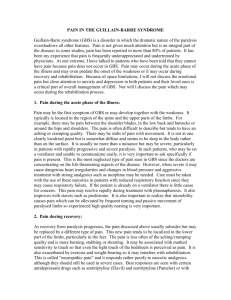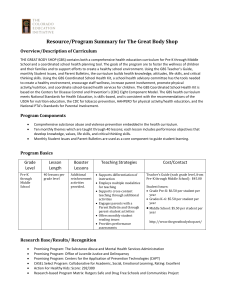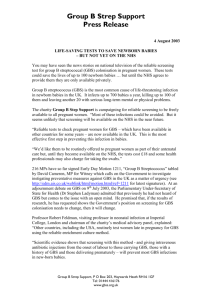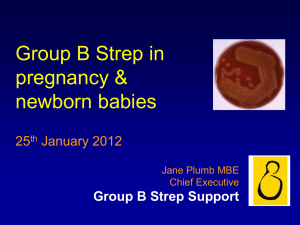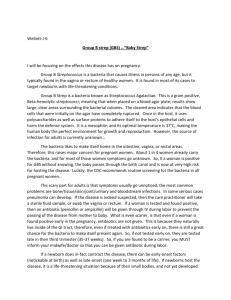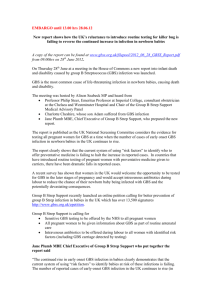GBS Petition to be delivered to Prime Minister on 23 January 2008
advertisement
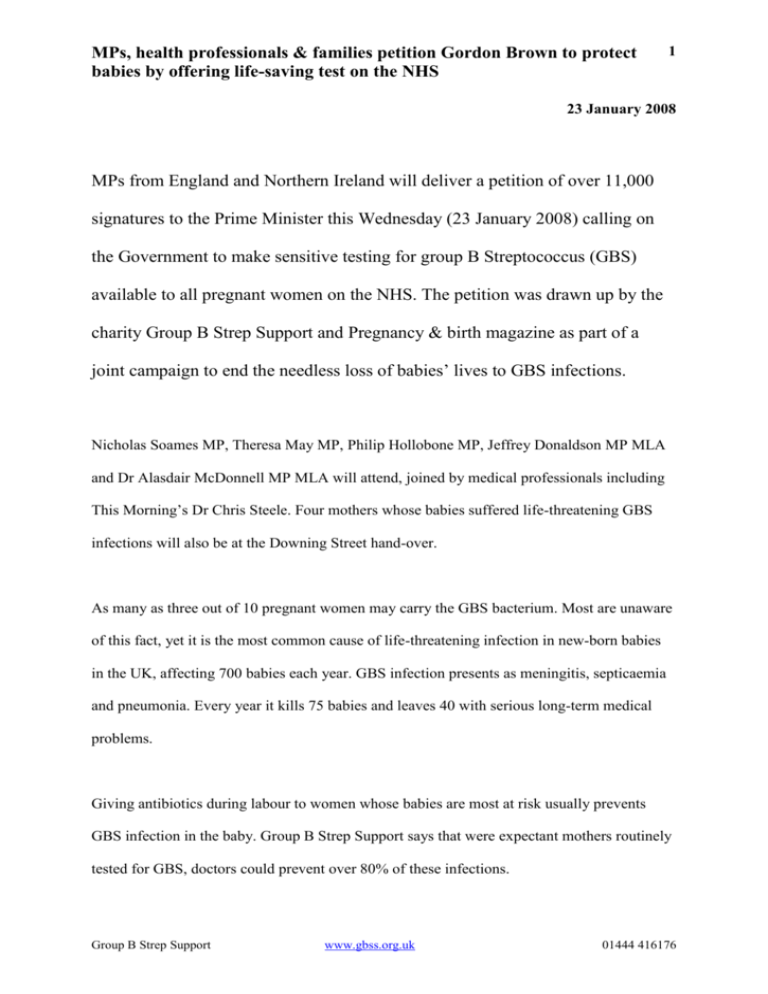
MPs, health professionals & families petition Gordon Brown to protect babies by offering life-saving test on the NHS 1 23 January 2008 MPs from England and Northern Ireland will deliver a petition of over 11,000 signatures to the Prime Minister this Wednesday (23 January 2008) calling on the Government to make sensitive testing for group B Streptococcus (GBS) available to all pregnant women on the NHS. The petition was drawn up by the charity Group B Strep Support and Pregnancy & birth magazine as part of a joint campaign to end the needless loss of babies’ lives to GBS infections. Nicholas Soames MP, Theresa May MP, Philip Hollobone MP, Jeffrey Donaldson MP MLA and Dr Alasdair McDonnell MP MLA will attend, joined by medical professionals including This Morning’s Dr Chris Steele. Four mothers whose babies suffered life-threatening GBS infections will also be at the Downing Street hand-over. As many as three out of 10 pregnant women may carry the GBS bacterium. Most are unaware of this fact, yet it is the most common cause of life-threatening infection in new-born babies in the UK, affecting 700 babies each year. GBS infection presents as meningitis, septicaemia and pneumonia. Every year it kills 75 babies and leaves 40 with serious long-term medical problems. Giving antibiotics during labour to women whose babies are most at risk usually prevents GBS infection in the baby. Group B Strep Support says that were expectant mothers routinely tested for GBS, doctors could prevent over 80% of these infections. Group B Strep Support www.gbss.org.uk 01444 416176 MPs, health professionals & families petition Gordon Brown to protect babies by offering life-saving test on the NHS 2 A sensitive test to detect GBS colonisation is not widely available on the NHS. It is available privately and costs around £32. Most mums-to-be aren’t offered a test for GBS at all. If they are, the one widely used by the NHS gives a false negative result to around 50% of carriers. According to recent medical research, testing all pregnant women for GBS using the sensitive test, plus treating those found to be at higher risk, would not only save lives but would save the Government £37 million a year. Jane Plumb set up the charity Group B Strep Support with her husband Robert after their second son, Theo, died from a GBS infection in 1996. She said: “It’s disgraceful that the NHS is using a test which is so unreliable. Offering accurate testing to all pregnant women on the NHS would enable mothers to protect their babies from this deadly infection. In many countries, Canada, France, Australia and the USA to name but a few, testing for GBS is a routine part of antenatal care – it’s high time the British Government caught up. This tragic death toll of tiny lives can and must be brought to an end.” For more information about group B Strep, please contact Group B Strep Support on 01444 416176 or visit www.gbss.org.uk. Ends Please find quotes from MPs, Dr Chris Steele and mothers affected by GBS in the notes to editors below. For more information about GBS, interviews with families who have experience of GBS infection in newborn babies, or with the charity’s medical advisors contact: Jane Plumb, Chairman, Group B Strep Support Tel: e-mail: 01444 416176 jplumb@gbss.org.uk Group B Strep Support www.gbss.org.uk 01444 416176 MPs, health professionals & families petition Gordon Brown to protect babies by offering life-saving test on the NHS 3 Notes to Editors: 1. The petition will be handed in to 10 Downing Street at 3pm on Wednesday 23 January 2008. 2. Two private medical laboratories provide sensitive testing for GBS. Packs containing the necessary swabs can be obtained free, and a postal service for carrying out the test normally costs around £32. Please contact either Mullhaven Medical Laboratory on 01234 831115 or at info@mullhaven.co.uk, or The Doctors Laboratory on 0207 307 7373 or at gbs@tdlpathology.com. GBSS has no links nor receives any money from any laboratory. 3. The research referred to in this press release was published on 11 September 2007 in the British Medical Journal and can be found at http://www.bmj.com/cgi/content/full/bmj.39325.681806.ADv2?maxtoshow=&HITS=10& hits=10&RESULTFORMAT=&fulltext=group+B+streptococcal&searchid=1&FIRSTIN DEX=0&resourcetype=HWCIT Prenatal Screening and treatment strategies to prevent group B streptococcal and other bacterial infections in early infancy: costeffectiveness and expected value of information analyses. Authors: T Colbourn, C Asseburg, L Bojke, Z Philips, K Claxton, AE Ades & RE Gilbert 4. David Cameron MP has tabled three Early Day Motions asking the Government to facilitate full implementation of the Royal College of Obstetricians and Gynaecologists’ (RCOG) national GBS guidelines, and urging the Department of Health to ensure sensitive testing for GBS carriage in pregnancy is urgently made available on the NHS. 5. Four mothers whose babies suffered GBS infections will be handing in the petition at Downing Street: Jane Plumb, West Sussex In March 1996, Jane and Robert Plumb’s second son, Theo, was born prematurely. He died of a group B Strep (GBS) infection just 17 hours later. Like most people, Jane had never heard of GBS. Despite desperate attempts to find out more she realised there was very little information available. So, she decided to do something about it. Within six months of Theo’s death, Jane and Robert set up the charity Group B Strep Support to provide information about and prevent GBS infections in babies, and to offer support to families affected by GBS. The charity has achieved significant progress in changing the way GBS is handled in hospitals in the UK, and in raising awareness of the issue at Government level. In 1998 Jane had a healthy third child, Camilla. Dawn Holwell, West Sussex Midwife Dawn Holwell had an apparently healthy baby boy, Alexander, in 1994. Six hours later he collapsed, and after just 17 hours of life he died in Dawn’s arms, overwhelmed by GBS infection. Dawn and her husband, David, a GP, knew very little about GBS at the time – as did most people. A year later, as part of her job, Dawn was asked to visit Jane Plumb, who had just lost her baby to GBS. Both women were determined to find out more about the infection that had taken their babies’ lives. Dawn and David have been involved in the charity Group B Strep Support from the start, and Group B Strep Support www.gbss.org.uk 01444 416176 MPs, health professionals & families petition Gordon Brown to protect babies by offering life-saving test on the NHS 4 have both served as Executive Committee members. The couple have since had three healthy boys, eleven-year-old Louis, Bertie, 5, and Henry, 2. Dawn said: “As a midwife I always tell pregnant women about GBS. Thanks to Group B Strep Support far more people have heard of GBS now, and it’s more acceptable for midwives and doctors to talk to their patients about it – in the past, I was told I’d scare pregnant women if I told them about GBS. I’d like to see a national screening programme introduced so that every mother-to-be is offered sensitive testing for GBS on the NHS. Carriers can then make an informed choice whether or not to have antibiotics during labour. If women don’t know about GBS, they can’t have that choice.” Debbie Slater, Berkshire In labour with her first child, Debbie Slater felt feverish and shivery. Her baby was in distress, so Debbie underwent an emergency Caesarean. Her daughter Amy was breathing rapidly when she was born. She was taken to the Special Care Baby Unit and diagnosed with GBS infection. Debbie said: “I was told they had found GBS and this could lead to meningitis and septicaemia, and that was about it. No-one could answer any questions and this was a horribly worrying time.” Amy received antibiotics twice daily until blood tests showed her to be clear of GBS for five days. Thankfully, Amy made a full recovery; she is now a healthy eight-year-old and has a four-year-old sister, Katie. Susanne Langley, Northamptonshire In 1999, Susanne Langley’s newborn baby died in the Paediatric Intensive Care Unit at Guy’s Hospital in London, where Susanne worked as a Sister. Her daughter died from a GBS infection, but like many medical professionals Susan knew very little about GBS at the time: “We looked after sick babies with GBS but I just assumed it was community acquired. It was only after Annabel died that I was told by my Consultant I was heavily colonised with GBS and that the infection had been passed on during delivery. The Consultant was South African and he explained that there they routinely screen for GBS. I was shocked and angry that my daughter had died from an easily preventable infection and that if I had lived in another country it would not have happened. I went on to contact Jane at Group B Strep Support and have been involved with the charity on and off ever since. I also undertook my dissertation looking at strategies for prevention of GBS in the UK.” Susanne has since had two healthy children – a daughter and a son. She added: “All pregnant women should be informed about GBS and given the choice of screening and antibiotics.” 6. Please use the following quotes from Dr Chris Steele and some of the MP’s supporting the petition: Dr Chris Steele, resident GP on ITV’s This Morning and Patron of Group B Strep Support says: "I have met families affected by GBS and heard their harrowing stories. I find it incredible that in this day and age an infection that is almost entirely preventable is still killing babies in the UK. I’d like to see every pregnant woman in the UK offered a reliable test for GBS on the NHS – until then, raising awareness is the key to saving babies’ lives." Group B Strep Support www.gbss.org.uk 01444 416176 MPs, health professionals & families petition Gordon Brown to protect babies by offering life-saving test on the NHS 5 Nicholas Soames MP: “The Government has so far failed to introduce routine screening of pregnant women for GBS carriage on the NHS. Perhaps they think it’s not worth the cost. But what is the cost to the NHS of caring for the 700 newborn babies each year who develop pneumonia, meningitis and septicaemia as a result of this infection, which is usually entirely preventable? Add to that, the ongoing costs of caring for the 40 or so babies who are left with permanent brain damage. Does it really pay the NHS to leave GBS infection to fate?” Jeffrey Donaldson MP: “I would like to commend the Support Group in Northern Ireland for the excellent work that they are doing to highlight the risks associated with group B Strep and to promote better screening and care in the Health Service." Theresa May MP: “Too few people know about GBS and we should be doing all we can to make sure the message is spread far and wide. Around 75 babies a year die from GBS and many more are poorly because of it. The Government is not doing enough to make sure that pregnant women know about this infection and its impact; and know how to find out if they are a carrier and what can be done if they are. GBS can be dealt with easily and effectively, but for too long we’ve been closing our eyes to the problem.” Dr Alasdair McDonnell, MP Dr McDonnell is supporting this campaign not just because he is an elected representative, but because he also works as a General Practitioner in South Belfast and many of his patients are expectant mothers. He strongly believes that every pregnant mother has the right to be tested for this potentially fatal but preventable infection. Philip Hollobone, MP "Were expectant mothers routinely tested for GBS, doctors could prevent over 4 in every 5 incidences of the most common cause of life-threatening infection in new-born babies. This is a serious issue affecting 700 babies each and every year and yet compared to the heartache of losing a baby, the solution is relatively simple and inexpensive: introduce routine testing for all pregnant women on the NHS." Group B Strep Support www.gbss.org.uk 01444 416176
